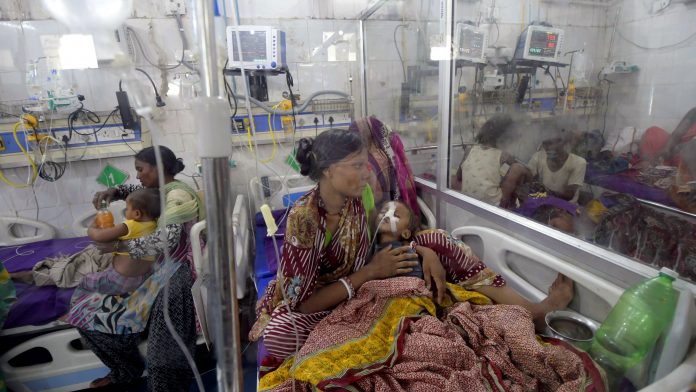
- 937Shares
New Delhi: The Nitish Kumar-led Bihar government has admitted to the state’s tattered public healthcare system, including a serious shortage of doctors – days after more than 150 children died due to an outbreak of Acute Encephalitis Syndrome (AES).
In its reply to a Supreme Court notice, the state government said Tuesday there was a shortage of 57 per cent doctors, 71 per cent nurses, 72 per cent lab technicians and 50 per cent Auxiliary nurse midwives (ANM) in its government-run health centres.
Considered one of India’s poorest states where malnutrition kills many children every year – also contributing to deaths due to AES – Bihar has 48.3 per cent stunted, 20.8 per cent wasted and 63.5 per cent anaemic children.
The government’s reply came in response to a notice issued by the top court that is hearing a public interest litigation (PIL) about measures taken to combat the deaths of children due to AES. The SC had, on 24 June, asked both the Centre and the state to apprise it within a week of the steps taken to tackle the outbreak and status of Bihar’s public medical care facilities.
In the plea, filed last month, advocate Manohar Pratap had said he was “pained and saddened” by the deaths of children in Bihar.
Shortage of doctors
The government said it had sent a request to the Bihar Technical Service Commission to expedite hiring of doctors and other healthcare professionals.
It also claimed to have taken steps to avoid another such crises in the future. The reply stated that fatality rates due to AES had dropped from 34 per cent in 2012 to 19 per cent now. The global rate of AES deaths at present is 30 per cent annually.
Steps taken to tackle AES
The government also said it had taken necessary steps to tackle the situation by providing additional medical facilities and public awareness programmes. Essential medicines have also been provided to patients and their families.
Hot meals and take-home ration is also available for enrolled beneficiaries under the supplementary nutrition programme in the state. Children in anganwadi centres will be provided eggs, milk and soya nuggets, and double-fortified salt will be provided on a pilot basis in the Tirhut division where the outbreak first began in early June.
The reply also said CM Nitish Kumar was personally monitoring the situation.
From interviews to new reports, catch ThePrint live in action on our YouTube channel. Subscribe here
- 937Shares